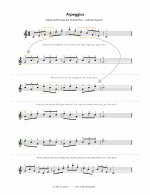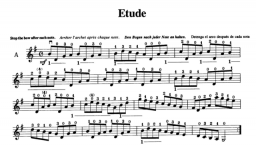When it comes to music, there are no rules.
When I wrote previously that there are no rules in music, I didn't mean to give the impression that there weren't excellent guidelines. What prompted me to write was that periodically someone will write to say that they want to "follow the rules" or "break the rules" about something, such as fingering or, in the current case, arpeggios. I don't think it is helpful to think in terms of rules, but rather to think about trying to find the best way
for you to achieve the goals
you have set for
yourself. If you are fortunate, you will have the help of good teachers to assist you though the various stages of your development. But either alone or with help, only you can solve all the idiosyncrasies of your physiology, previous musical experience, mental and emotional approach to practicing, your particular instrument, and so on. There no fixed rules for how to do this.
If I were going to make a few rules that everyone was required to follow, they would be along these lines: pay careful attention to what you are doing; before you start practicing, have something specific to work on; go slow enough to make it possible for you to do whatever it is you are trying to do in a relaxed, stress-free manner. There is an analogous saying among runners, triathletes, swimmers, and cyclists—"no junk miles." It means no sloppy, thoughtless "working out," but rather
always practicing something—pace, cadence, body position, and so on. The idea is that time spent carefully practicing something will bring greater long-term benefits in a shorter period of time than just thoughtlessly going through the motions.
When it comes to arpeggios, what are we hoping to accomplish? Are we learning our way around the keyboard? Are we trying to develop muscle memory of the chord shapes? Are we training our ears to hear the harmonic relationships? Are we trying to learn to play legato or staccato? Are we building finger strength? Are we learning to play evenly? Are we practicing phrasing?
Let's say you are trying to learn to play cegcegcegc up and down the keyboard for some good reason, but you keep screwing up. Maybe you need to turn the metronome down and play more slowly. If playing slowly seems too boring, why not strengthen your 4 and 5 fingers at the same time by playing something like this:
cegggg cegggg cegggg
or cegege cegege
making up your own fingering to get 4 and 5 into action as much as possible.
"But I don't know the right way to do it?" "How long should I hold the notes?" "Which fingers should I use for the c and the g?" Should I also do it with inversions?
These questions are what I am talking about when I say there are no rules. Just make something up. Don't worry about it. Play it like you are serenading Juliet up there on the balcony. Play like you are in a funny costume trying to make a little kid laugh. You will be better off if you carefully practice whatever you make up than if you don't practice it. And your 4 and 5 fingers will thank you for it later.
What if the next time you attend the accordion rules committee meeting you learn that the guy around the corner made up an even better way to practice arpeggios slowly while strengthening 4 and 5? Great! Start doing it that way.
Above all, be kind to yourself. Work diligently, but at a pace that is reasonable for you. Banish any negative self-talk. Rome wasn't built in a day. Be persistent, but also be patient.




